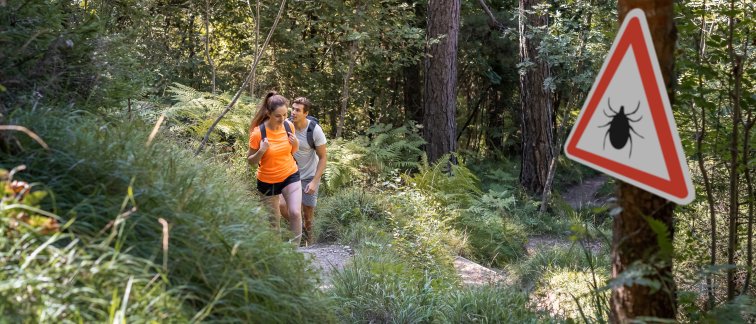It is peak tick season, due to the mild winter and wet spring. Wim Eikelboom, a river journalist and tree enthusiast, experienced this firsthand after a morning walk last month when he found 23 ticks on his body. Joppe Hovius, professor of infectious diseases at Amsterdam UMC and director of the AI&I research institute, is involved in a large Lyme disease vaccination trial.
Eikelboom often explores nature, as he did on a recent morning with plans to cycle through the Veluwe to observe trees and wildlife. While acknowledging the risks of wandering off paths, he encountered the consequences upon finding 23 ticks, some still wandering and a few already attached to his body.
Inadequate footwear
‘When there is a lot of wildlife in the forest, ticks are plentiful, especially along game trails’, Eikelboom notes. ‘On previous trips, I would come home to find twelve or thirteen ticks, but never this many.’ He admits that he was not dressed well for a nature trek: ‘A careless mistake. I wore long pants but opted for sandals since we planned to cycle. It is a decision you should not make when hiking in the woods’. The RIVM reports approximately 1,5 million tick bites annually in the Netherlands. While most are harmless, approximately 2 to 3 percent result in Lyme disease, affecting about 27,000 people each year.
Long-term effects
The incidence of Lyme disease has steadily risen over the years, with approximately 18.000 cases in 2005, 22.000 in 2009 and currently 27.000 annually. Although antibiotics can often effectively treat the disease, caused by a bacterium, an estimated 1.000 to 2.500 individuals annually suffer from long-term symptoms, resembling those seen in post-COVID syndrome. If diagnosed with post-Lyme disease syndrome, symptoms may include fatigue, concentration difficulties, and muscle and joint pain.
Lyme disease is transmitted when an infected tick, carrying the Borrelia burgdorferi bacterium, bites a human. "The longer the tick remains attached, the higher the likelihood of bacterial transmission," explains Joppe Hovius, professor of infectious diseases at Amsterdam UMC. In 2013, Hovius founded the Amsterdam UMC Multidisciplinary Lyme Disease Center (AMLC) to better treat patients with Lyme diseases.
The AMLC is currently involved in an international study by pharmaceutical companies Valneva and Pfizer to develop a vaccine against Lyme disease. This research, ongoing in the United States and Europe for several years, is anticipated to conclude by the end of next year.

Antibodies in ticks
The vaccine in question is a so-called transmission-blocking vaccine designed to prevent the Lyme disease bacterium from being transmitted from ticks to humans. ‘If you are vaccinated and bitten by an infected tick, the antibodies elicited by the vaccine will enter the tick and eliminate the bacterium before it can infect your body,’ Prof. Hovius explains.
Currently, researchers are investigating the effectiveness and safety of the vaccine. Wim Eikelboom is one of the study participants. ‘Over the past two years, I have traveled to Amsterdam several times. As a participant, I receive a shot without knowing if it is the actual vaccine or a placebo," he explains. ‘Blood samples are taken to monitor antibody production, and my health is closely monitored. I also track any tick bites I get and report them.’
Therefore, Eikelboom is not certain if he received the vaccine,there is still a possibility he could contract Lyme disease. ‘I am cautious about ticks, though not overly worried," Eikelboom admits.
‘My family thinks I am too relaxed about it. Sometimes I walk in nature wearing sandals and shorts; perhaps I should consider investing in tick-resistant pants.’ Despite his attitude, Eikelboom takes Lyme disease risk seriously, remaining alert for symptoms like red rings on his body or neurological issues. ‘I always keep in mind that it could happen any day. Lyme disease is a serious concern, which is why I'm part of the Amsterdam study with Prof. Hovius.’
This article is a revised version of an article originally published in Dutch on RTL.nl. Access the original piece here.
Learn more about our AI&I Lyme research:
Enhanced Understanding of Genetic and Immunological Aspects of Lyme Disease (May 2024)
Unlocking Tick Immunity in Humans: Paving the Way for an Anti-Tick Vaccine (October 2024)
Professor Hovius: this is how much chance you have of contracting Lyme disease after a tick bite (June 2023)

